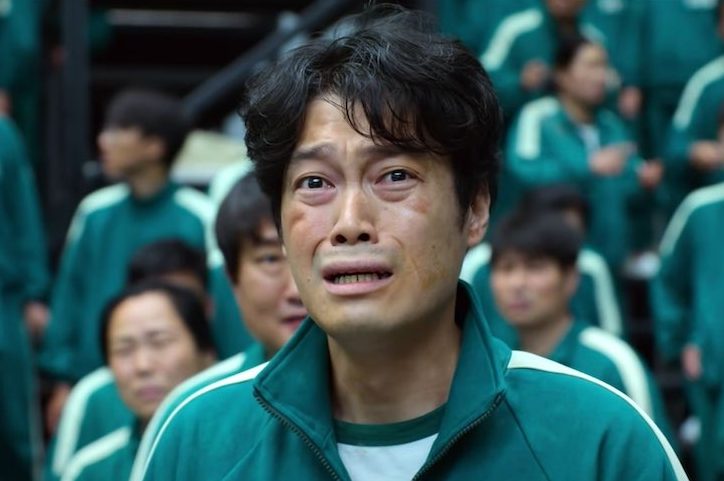
Streaming columnist NICK OVERALL looks at the phenomenal success of a disturbing South Korean drama that’s sweeping the world.
SO popular has the disturbing, South Korean curio “Squid Game” become that an internet service provider is suing Netflix for maintenance costs caused by too many people trying to watch it.

The fictional drama series asks the extreme, yet morbidly fascinating question: how far would people drowning in debt go to earn a fortune? And millions of viewers have wanted an answer.
For those who don’t know, in “Squid Game”, characters are plucked off the streets by mysterious figures and pitted against each other in increasingly macabre children’s games.
Win, and the cash-strapped contestants keep their chance alive at taking home millions of dollars; lose, however, and the penalty is death.
It’s become the most watched program in 90 countries, sent Netflix’s stock price through the stratosphere and, according to the streaming giant’s CEO, has a very good chance of becoming its most watched series of all time.
So what has made “Squid Game” such a success?
There’s something about taking a group of people and throwing them into a game of life or death that seems to capture modern audiences.
Take for example last decade’s phenomenon of “The Hunger Games” (Netflix), the story of a 16-year-old girl tossed into a dangerous, televised tournament where 24 teenage competitors must fight to the death until only one remains.
Those who got a thrill out of “Squid Game” may also take interest in “Circle” (Netflix) a gimmicky film where 50 strangers are put into a room and who have to vote on only one person to survive.
This concept is so popular in its more extreme forms such as the “Saw” franchise, which this year had its ninth film release, and also in its milder forms such as the reality television phenomenon “Survivor” (on Paramount Plus, Ten Play), still successful after two decades and more than 40 seasons.
There’s a question that lies at the heart of why the idea of a “deadly” game is so appealing to so many: “What would I do?”
Audiences love pondering how they would compete and how well others they know would compete.
“Would I be the winner?”
“Squid Game” is the ultimate iteration of the question.
In the show, simple games such as tug-o-war are used to extreme, suspenseful effect and that being a game that most audience members will have played at least once in their life, inserting oneself into the drama becomes all the easier.
Factions of society split off into different “teams” that any viewer will be familiar with.
There’s the group of bullies who value strength over all.
There’s the cunning outsiders who think success lies in trusting themselves and nobody else.
There’s those who cling on to their morals, and others who abandon them entirely for a shot at the grand prize.
Things such as old age are seen by many competitors as weakness, but without going into spoiler territory, “Squid Game” cleverly puts forward the idea that wisdom may be just as powerful as muscle.
Much of its success is also owed to its uncanny aesthetics, well serving its bizarre concept.
The mysterious guards who one might call the “deadly referees” of the games wear bright pink, one-piece outfits and ominous shapes mark their covered faces and denote their ranks.
In contrast, contestants wear gloomy green tracksuits, and are marched through environments that look like a painting by optical-illusion artist MC Escher.
That’s just the start of the weirdness here. The childhood games use creepy dolls and place contestants in surreal locales while strange echoey music hums in the background.
Every moving part of “Squid Game” serves to grab attention and when scrolling through the endless feed of Netflix content, stuff like this makes it easy for the show to catch eyes and ears.
There’s also the fact that once watching, one can read into “Squid Game” as little or as much as one likes and it still makes for punchy entertainment.
Want a violent, extreme commentary on the modern economic climate holding up the weight of capitalism? Sure.
Want to see a few hundred people risk their lives for money in a series of creepy games? Go for it.
Want both? Works all the same.
Interestingly, the show’s creator Hwang Dong-hyuk originally penned the script in 2008, but believed it too “grotesque” and “extreme” to be a success back then.
One can only speculate on what a release in 2008 would be like compared to now, but it’s fair to say that the drop of a show such as “Squid Game” in a political and economic climate that’s divided as it is right now? That’s certainly no fluke.
Who can be trusted?
In a world of spin and confusion, there’s never been a more important time to support independent journalism in Canberra.
If you trust our work online and want to enforce the power of independent voices, I invite you to make a small contribution.
Every dollar of support is invested back into our journalism to help keep citynews.com.au strong and free.
Thank you,
Ian Meikle, editor




![For graphic designer Tracy Hall, street art is like any artwork, her canvas has been swapped out for fences and plywood, her medium changing from watercolours to spray paint.
A Canberra resident for 13 years, Tracy has been a street and mural artist for the past five.
Her first exploration into grand-scale painting was at the Point Hut toilets in Banks five years ago. “They had just finished doing up the playground area for all the little kids and the words [of graffiti] that were coming up weren’t family friendly,” she says.
“So I ended up drawing this design and I got approval for the artwork.”
Many of Tracy’s time-consuming artworks are free, with thousands of her own dollars put into paint.
@traceofcolourdesigns
To read all about Tracy's fabulous street art, visit our website at citynews.com.au or tap the link in our bio! 🎨🖌
#canberranews #citynews #localstories #canberrastories #Citynews #localnews #canberra #incrediblewomen #journalism #canberracitynews #storiesthatmatter #canberralocals #artist #streetart #streetartist #StreetArtMagic](https://scontent.cdninstagram.com/v/t39.30808-6/490887207_1225841146218103_6160376948971514278_n.jpg?stp=dst-jpg_e35_tt6&_nc_cat=106&ccb=1-7&_nc_sid=18de74&_nc_ohc=1BXnbxXvf_8Q7kNvwGxh1zh&_nc_oc=Adkh3RxuUkrP0SYqfZ05hihf5KR4C5x0esctcQMhxNfh7FjQpPqh6aJiWWGR5JJn29Y&_nc_zt=23&_nc_ht=scontent.cdninstagram.com&edm=ANo9K5cEAAAA&_nc_gid=F56SSof8Rx0va5tImNGCFw&oh=00_AfHsvWhqDuoBTQn4Bvmra0tBDa1dxrfiG1A1rNkYRbv6dA&oe=680CDD94)



Leave a Reply